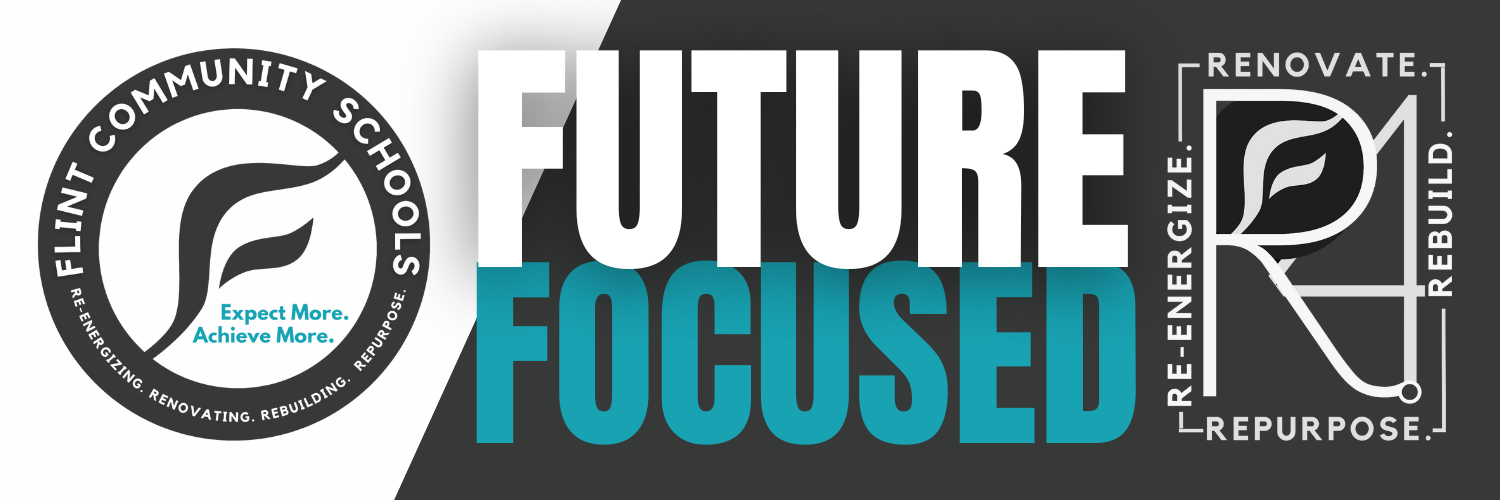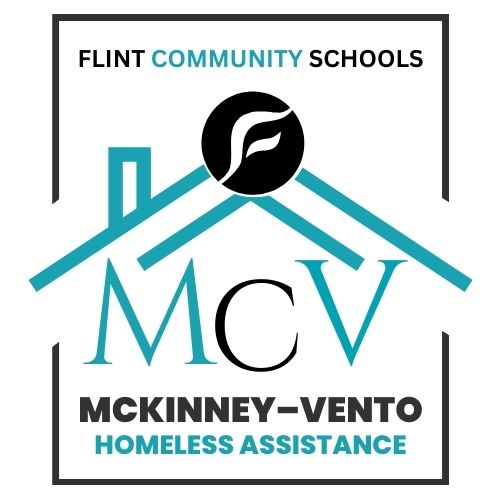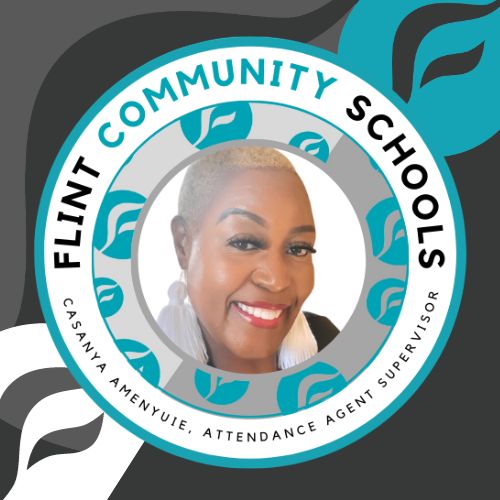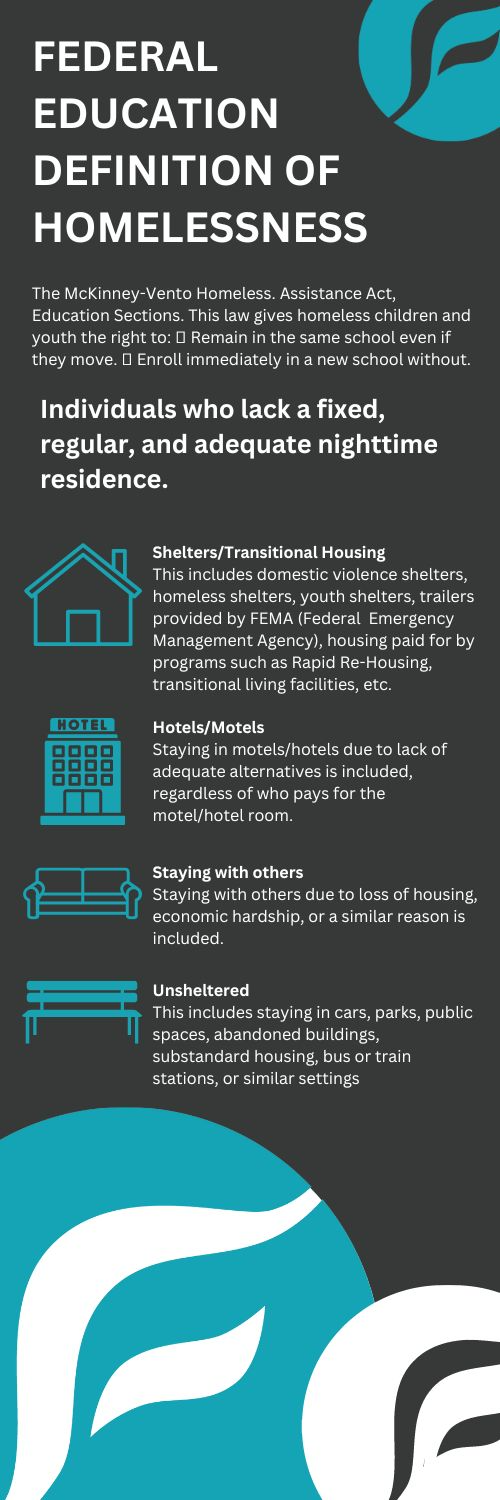

Homeless Assistance Act - McKinney Vento
Flint Community Schools (FCS) is dedicated to supporting children and youth experiencing homelessness by ensuring their educational rights and protections under the McKinney-Vento Homeless Assistance Act. This federal law provides critical support to over 1.1 million children and youth annually, addressing the unique challenges they face, including:
Basic Needs: Many students experiencing homelessness lack access to essentials such as food, clothing, and medical care.
Educational Disruptions: Frequent relocations often interrupt their learning and create additional barriers to academic progress.
Emotional and Psychological Impact: Unstable living conditions and poverty contribute to significant emotional and psychological stress.
For homeless children and youth with disabilities, these challenges are further compounded. FCS adheres to the Individuals with Disabilities Education Act (IDEA) to ensure students with disabilities receive the specialized services they need to thrive. By strengthening collaboration across different support programs, FCS aims to provide comprehensive assistance to homeless students and their families.
Under the McKinney-Vento Act, homeless children and youth are granted immediate school enrollment without the usual documentation requirements and are entitled to remain in the same school despite residential changes. Each district, including FCS, has a designated homeless education liaison responsible for identifying and assisting homeless students, ensuring they have access to consistent education and support services.
The McKinney-Vento Act defines homelessness broadly to include children and youth who:
Share housing due to economic hardship or housing loss.
Reside in motels, trailer parks, or campgrounds due to the lack of alternative housing.
Stay in shelters, transitional housing, or non-permanent settings such as cars or substandard accommodations.
The goal of Flint Community Schools, in alignment with McKinney-Vento, is to provide a stable, supportive, and nurturing educational environment, ensuring that every student, regardless of their housing situation, has the opportunity to succeed.
The McKinney-Vento Homeless Assistance Act ensures the educational rights and protections of children and youth experiencing homelessness.
Over 1.1 million children and youth are affected by homelessness annually. These young individuals confront numerous challenges, such as:
Scarcity of basic needs like food, clothing, and medical care.
Educational disruptions due to frequent relocations.
Emotional and psychological stress stemming from poverty and unstable living conditions.
For children and youth with disabilities who are homeless, these challenges are compounded. Adhering to the Individuals with Disabilities Education Act (IDEA) is crucial in ensuring these children and youth receive the necessary services to thrive in educational settings and beyond. Enhancing collaboration across different programs can also significantly improve support for homeless children and youth.
In terms of assistance available for families dealing with homelessness, the McKinney-Vento Act plays a pivotal role. This federal legislation grants immediate school enrollment rights to homeless children and youth, bypassing typical document requirements. It also allows them to remain in the same school even amid residential changes.
Every school district is required to have a designated homeless education liaison. This individual is responsible for identifying and providing support to homeless children and youth within the district.
McKinney-Vento Act
Subtitle VII-B of The McKinney-Vento Homeless Assistance Act authorizes the federal Education for Homeless Children and Youth (EHCY) Program and is the primary piece of federal legislation related to the education of children and youth experiencing homelessness. It was reauthorized in December 2015 by Title IX, Part A, of the Every Student Succeeds Act (ESSA).
How does McKinney Vento define homelessness?
The McKinney-Vento Act defines homeless children and youth as individuals who lack a fixed, regular, and adequate nighttime residence. This definition also includes: Children and youth who are sharing the housing of other persons due to loss of housing, economic hardship, or a similar reason.
The McKinney-Vento Act provides rights and services to children and youth experiencing homelessness, which includes those who are:
Sharing the housing of others due to loss of housing
Economic hardship or a similar reason
Staying in motels, trailer parks, or campgrounds due to the lack of an adequate alternative
Staying in shelters or transitional housing or sleeping in cars, parks, abandoned buildings, substandard housing, or similar settings.
The McKinney-Vento Homeless. Assistance Act, Education Sections. This law gives homeless children and youth the right to:
Remain in the same school even if they move.
Enroll immediately in a new school without.


